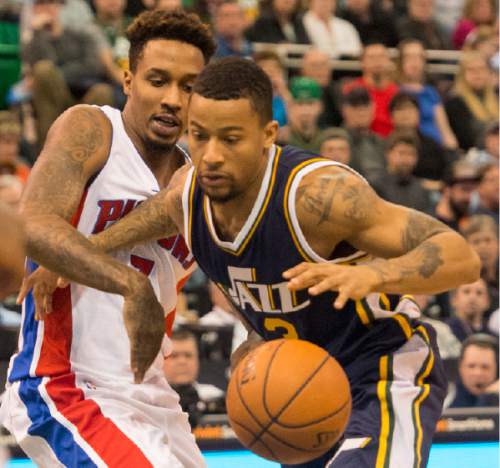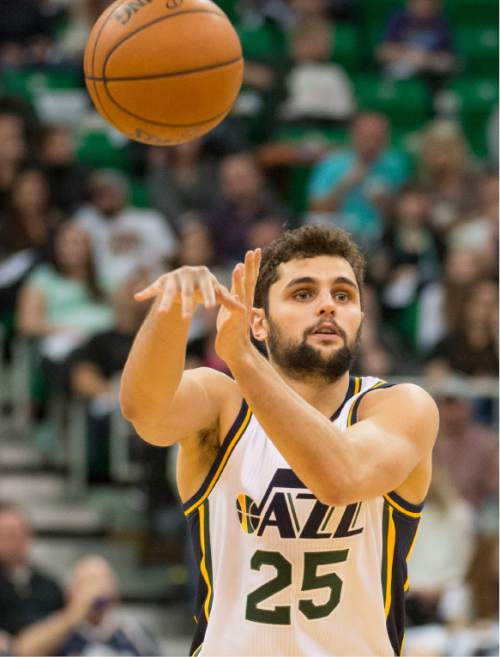This is an archived article that was published on sltrib.com in 2016, and information in the article may be outdated. It is provided only for personal research purposes and may not be reprinted.
So, about the Jazz's point guard situation … what should they do?
With Dante Exum out, the team's defense up top has been compromised, allowing some opponents to get loose and score big. Guys like Kemba Walker and Reggie Jackson putting 52 and 29 points on the Jazz in recent defeats. Walker and his Hornet teammates went at the Jazz again on Wednesday night, the results this time being a Utah win, with Walker limited to 15 points on 7-for-11 shooting. Still, according to numbers compiled by The Tribune's Aaron Falk, the Jazz have allowed 20-plus points from opposing point guards 16 times this season.
That's a problem.
It's a bigger problem added to the fact that at the other end the Jazz too often struggle to get into their offense without a dominant/proper/adequate quarterback initiating their flow.
The players behind Exum — Raul Neto and Trey Burke — have attempted to limit the negative effect of his loss, but the results have been inconsistent and insufficient. It's not their fault on a couple of counts: 1) A string of injuries to other key players have handicapped the Jazz, all around, and 2) Neto is a rookie and Burke is what he is.
Prior to the start of the season, Burke, now in his third year, talked about becoming more of a pro's pro, preparing himself better, fueling his body better, taking his responsibilities on and off the floor more seriously. He's done those things, admirably. But he's still a diminutive guard who is not exceptionally quick, nor is he a great shooter or a great passer. He's a good backup. Defending NBA point guards, some of the most explosive athletes on the planet, is a lot to ask of him. When he gets in a rhythm, he can score, and is particularly effective coming off the bench, going against second-tier guards.
As the Jazz get themselves back together, with Rudy Gobert and Derrick Favors healthy again, they should be able to make up for some of their defensive deficiencies out front. After beating Charlotte, Snyder complimented his big men, and said the entire team gathered itself, playing less than flawless, but putting up an improved effort: "Our defense was solid … from a mental standpoint, we were more locked in."
Imagining what might be when all the Jazz's young frontline players are back on the court — something that won't happen until the start of next season, after Exum has fully recovered from his knee surgery — is a promising visual. It takes no real stretch to see them as one of the best defensive teams in the NBA.
They are yet far from the point of no return.
When Alec Burks returns in a month or so, even with an incomplete rotation at the point, the Jazz might be able to tear off another run like what was seen down the stretch last season, when they finished 19-10.
Their mark of success, with all the adversity they've faced this season, is making the playoffs, even as an eighth seed, which would grant them the privilege of getting eliminated by the Warriors in the first round. That would be enough, setting up a critical season next year, a season in which the pressure will be on to do something more, not just to legitimize and substantiate Jazz management's plan, but to make the prospect of sticking around more attractive for certain players, such as Gordon Hayward, who will have options to sign elsewhere.
Before the road leads to that, the question is: What should the Jazz do to ensure they'll qualify for the postseason this time around? Should they do more to bolster the point guard spot than simply signing Erick Green out of the D-League? Should they go after a guy like Jeff Teague, who is said to be available from Atlanta, or some other veteran from some other team, for the right price?
The answer depends on to what degree the Jazz believe in Exum.
If their belief is firm, there's no reason to bring in a costly established veteran, an asset that would duplicate what Exum is projected to do. If they could find an able player with a short contract, one that could better orchestrate the Jazz's attack and D-up a bit, enough to increase their shot at the playoffs in April, and then come off the books, that would be a savvy move — but only if it wouldn't rupture the financial flexibility so safely built and guarded by the Jazz over the past couple of years.
Dennis Lindsey has said he's waiting for the right player(s) to move on when the time and opportunity are right. What's worse than lagging on spending is spending on the wrong players. The latter is death to a rebuild. Essentially, Lindsey wants to strike at just the right moment to push the Jazz to a place and position for them to contend, as the young core matures.
The Jazz could trade a combination of Burke and draft picks for help at the point, but, again, that interferes with Exum's ascent.
Short of landing the right point guard with the right contract for the right price — all a long shot — the Jazz are better off waiting just a bit longer, showing enough patience, one more time around, to let what they have recover and jell. If they can get enough out of Burks, when he returns, which he said on Tuesday he is eager to do, covering for some of their deficiencies at the point with the three-wing approach for the remainder of this season, edging into the playoffs, that would be satisfactory and sufficient.
But, as mentioned, next season is when the gap must be bridged, when the winning must come in greater numbers, when a strong upward move must be clearly evident to Jazz fans and to the players themselves who have understood the misfortune of adversity this season and been patient through the whole process.
Next season, that patience, come what may, must be rewarded.
GORDON MONSON hosts "The Big Show" with Spence Checketts weekdays from 3-7 p.m. on 97.5 FM and 1280 AM The Zone. Twitter: @GordonMonson.





